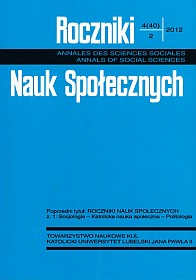Wielka Brytania we Wspólnotach Europejskich i Unii Europejskiej
Abstrakt
The relationship between Britain and Europe has always been strained. Europe has been seen as a menace rather than an opportunity. Britain used to slow down the process of integration and consequently has often fallen behind and had no choice but to catch up. However, the portrayal of Britain as an “awkward partner” is only partly justified. Based on its specific understanding of national sovereignty, Britain has developed a much more pragmatic and instrumental approach towards Europe. Nevertheless, the country was a strong driving force of integration in many crucial fields, like the single market or trade policy. Britain has always accepted its membership in the European Communities only when exclusion from them could threaten Britain’s national interest, mainly in the economic dimension. Thus Britain’s membership in the Communities has always been selective. Britain decided to join the European Communities mainly because of its poor economic performance in the beginning of the 1960s.
Bibliografia
Ahlt M., Szpunar M., Prawo europejskie, Warszawa: C.H. Beck 2002.
Antoszewski A., Herbut R., Socjaldemokracja w Europie Zachodniej. Studium porównawcze, Wrocław: Wydawnictwo Uniwersytetu Wrocławskiego 1995.
Bartlett C.J., A History of Postwar Britain, London: Longman 1977.
Blair T., Trzecia Droga. Nowa polityka na nowe stulecie, [w:] Spory wokół Nowej Trzeciej Drogi, red. T. Kowalik, Warszawa: Scholar 2001.
Butler D., Kitzinger U., The 1975 Referendum, Basingstoke: Macmillan 1976.
Childs D., Britain Since 1945, London & New York: Routledge 2001.
Ciamaga L. [i in.], Unia Europejska. Podręcznik akademicki, Warszawa: Wydawnictwo Naukowe PWN 2002.
Dobroczyński M., Ekonomiczne mocarstwa Unii Europejskiej, Toruń: Wydawnictwo Adam Marszałek 2002.
Dorey P., British Politics since 1945, Oxford UK & Cambridge USA: Blackwell 1995.
Frankel J., British Foreign Policy 1945 – 1973, London: Macmillan 1975
Gehler M., Kaiser W., Christian Democracy in Europe Since 1945, vol. II, Oxford: Routledge 2004.
Giddens A., Trzecia Droga. Odnowa Socjaldemokracji, tłum. H. Jankowska, Warszawa: KiW 1998.
Glyn A., Wood S., Polityka ekonomiczna Nowej Partii Pracy, [w:] Spory wokół Nowej Trzeciej Drogi, red. T. Kowalik, Warszawa: Scholar 2001.
Grant Ch., Britain on the edge of Europe, http://www.opendemocracy.net
Grant Ch., Why is Britain eurosceptic? Analiza dyrektora Centre for European Reforms, http://www.cer.org.uk
Greenleaf W.H., The British Political Tradition, vol. II: The ideological heritage, London: Routledge 1983.
Hennessy P., Whitehall, London: Fontana 1990.
Ingle S., The British Party System, Oxford: Blackwell 1987.
Jassem A., Wielka Brytania a Wspólnoty Europejskie: aspekty ustrojowo-polityczne, „Studia Europejskie” 2003, nr 1.
Kaliński J., Historia gospodarcza XIX i XX wieku, Warszawa: PWE 2004.
Kitzinger U., Diplomacy and Persuasion: How Britain Joined the Common Market, London: Macmillan 1973.
Mandelson P., Liddle R., Can New Labour Deliver?, London: Faber & Faber 1996.
May A., Britain and Europe since 1945, London & New York: Longman 1999.
Miłkowski M., Jak uratować Europę, „Gazeta Wyborcza” z 24 czerwca 2005.
Morgan M., The Politics of Industrial Relations, Basingstoke 1977.
Nicholls A., Britain and the EC: the historical background, London: Macmillan 1990.
Ramsden J., The Oxford Companion to Twentieth Century of British Politics, Oxford: Oxford University Press 2005.
Sporek T., Teoria i praktyka głównych założeń europejskiej unii walutowej, „Studia Europejskie” 1997, nr 4.
Techau J., Der gebremste Europäer, „Biuletyn Niemieckiego Towarzystwa Polityki Zagranicznej”, luty 2008, nr 1.
Wallace W., What price independence? Sovereignty and independence in British politics, “International Affairs” 1986, nr 62/3.
White M., Kontynent odcięty, „Gazeta Wyborcza” z 28-29 stycznia 2012.
Copyright (c) 2012 Roczniki Nauk Społecznych

Utwór dostępny jest na licencji Creative Commons Uznanie autorstwa – Użycie niekomercyjne – Bez utworów zależnych 4.0 Międzynarodowe.


